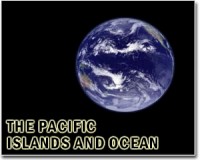| . |  |
. |
Bristol UK (SPX) Dec 02, 2010 Unseasonal warm temperatures caused by El Nino have a profound effect on the fish populations of coral reefs in the South Pacific, scientists have found. An international team of biologists studied the arrival of young fish to the atoll of Rangiroa in French Polynesia for four years and compared their results with satellite and oceanographic data. They found that the El Nino event caused a sudden collapse in the plankton community and this led to a near absence of the young fish that are required to replenish adult stocks. Coral reef fishes are bad parents. Rather than caring for their young, they disperse them into the open waters off the reef where they drift with the currents while they grow and develop into small juveniles, at which point they make their way back again to the reef. This process allows these baby fish to feed on plankton and escape the predators that would consume them if they had to grow up on the reef with adults. But in a changing climate, this dispersal into the haven of open water could now become an Achilles' heel for coral reef fishes. Using a crest net - which looks like a football goalmouth facing out to sea on the edge of a barrier reef - the scientists were able to monitor the numbers of fish as they returned to reefs from open water. Under the supervision of Professor Rene Galzin, Dr Alain Lo-Yat and assistants from Service de la peche set and emptied the net on the atoll of Rangiroa for four years, a period that included the intense 13-month El Nino event of 1997-8. Climate scientist Elodie Martinez from France and marine biologists Dr Steve Simpson and Dr Mark Meekan then analysed the data, the longest time-series of its kind, to detect and explain the worrying trends. The paper is published in the journal Global Change Biology. Dr Steve Simpson from the University of Bristol's School of Biological Sciences said: "Near to the equator, fish arrive throughout the year to replenish adult populations. In contrast, during the El Nino event at Rangiroa, when temperatures climbed up to 3.5C above the seasonal average, we found that the young fish virtually disappeared. "Analysis of satellite images around Rangiroa suggested that plankton, the food supply for many baby and adult reef fishes, declined dramatically during the warm waters of El Nino. As a consequence, adults struggled to produce offspring and young fishes were likely to starve when in open waters off reefs. Just 1-2 months after the onset of the warm conditions, the next generation of young fish stopped arriving so that adult stocks were no longer being re-supplied." Dr Meekan said: "The events we witnessed during El Nino are a worrying sign for the future when climate change is predicted to warm ocean temperatures and may even increase the frequency of the El Nino phenomenon". Warns Dr Simpson: "Coral reef fisheries provide food and livelihoods for hundreds of millions of people throughout the world and underpin a multi-billion dollar tourism industry. Our study shows that warmer waters may leave fish stocks on reefs in serious trouble, which will have far-reaching consequences for the people around the globe who are dependent upon them."
Share This Article With Planet Earth
Related Links University of Bristol Water News - Science, Technology and Politics
 Teens survive on seagull for 61 days adrift in Pacific
Teens survive on seagull for 61 days adrift in PacificSuva (AFP) Nov 26, 2010 Three teenagers who survived on rainwater and a seagull during 61 days adrift off their remote Pacific territory of Tokelau were safe in Fiji on Friday after what was hailed as a "miracle" rescue. They were plucked from the water as weather forecasters warned of a tropical cyclone bearing down on Fiji. It was initially believed the boys had been at sea for 50 days, based on search report ... read more |
|
| The content herein, unless otherwise known to be public domain, are Copyright 1995-2010 - SpaceDaily. AFP and UPI Wire Stories are copyright Agence France-Presse and United Press International. ESA Portal Reports are copyright European Space Agency. All NASA sourced material is public domain. Additional copyrights may apply in whole or part to other bona fide parties. Advertising does not imply endorsement,agreement or approval of any opinions, statements or information provided by SpaceDaily on any Web page published or hosted by SpaceDaily. Privacy Statement |